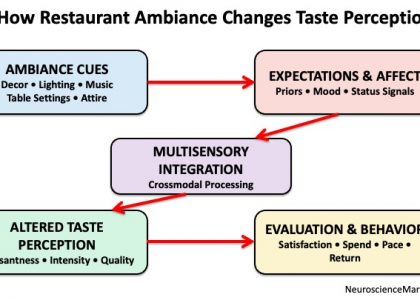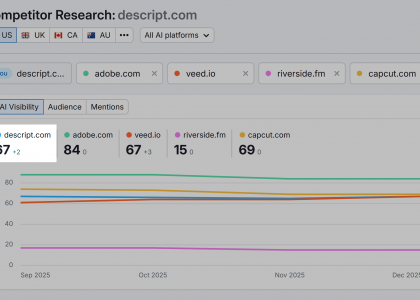Brand tone of voice helps distinguish you from your competitors. It’s the way your business communicates its perspective, mission, and values in specific words that resonate with your target audience’s needs and wants. Your tone influences how people perceive your brand.
You use tone of voice in marketing to express your brand’s personality through text. It’s the cadence, nuance, and connotation that goes along with each sentence.
Even if the final product becomes an audio ad or video tutorial, text is the foundation of all content marketing formats.
In this article, you’ll discover:
How a precise tone attracts the right people to your content
The importance of a recognizable brand tone
Tone of voice examples to study
A proven system for developing your tone
How to use tone of voice guidelines
A Tale of Two SEO Tones
Let’s look at a quick example of how tone of voice can affect content in the SEO space.
Backlinko’s confident brand tone of voice builds trust and establishes the website as a go-to resource for cutting-edge digital marketing strategies.
On Backlinko, you know you’re getting SEO tips you can immediately use.
Contrast this tone with The SEO Rant!, a lively and humorous podcast.
Backlinko and The SEO Rant! give advice in the same niche, but Backlinko’s brand tone conveys precise guidance, and The SEO Rant!’s brand tone conveys unfiltered passion.
The tone of each brand’s content manages expectations and gives you a sense of the type of SEO knowledge it offers.
Why Tone of Voice Affects the Success of Your Content Marketing
Blog posts, social media posts, and email messages are common forms of written communication that benefit from a strong brand tone of voice.
Your business has a greater chance of becoming a tastemaker if you communicate a distinct point of view through your voice.
What’s a tastemaker?
Let’s look at the definition:
Tastemaker (noun): a person, company, etc. that has an influence on what will become fashionable, or considered to be of good quality
As a tastemaker, you’ll have an easier time connecting with your audience and deepening your relationships.
You want every person who finds your content to have the same unforgettable experience with your brand.
We need tastemakers to rise above mediocrity.
The brand voice guidelines outlined later in this article will help you maintain a consistent tone throughout your content.
With the right instructions, your SEO writing can go beyond basic words on a page to pique curiosity, provoke thought, and form a deep bond with your reader.
Effective content marketing doesn’t just superficially match search intent. It empathizes with the reader, listener, or viewer’s needs. Which makes your brand memorable.
Nerd Fitness, an online fitness training business, is a masterclass on using tone to build an engaged community and loyal customers.
Firstly, the brand’s name, “Nerd Fitness,” instantly polarizes, compelling you to quickly decide if it’s right for you.
Then, when you visit the website homepage, you see language like “The Best Newsletter in the Galaxy” or “Welcome to the Nerd Fitness Rebellion”:
Words like “galaxy” and “rebellion” show the brands’ commitment to nerdy pop-culture references.
This applies to the language they use on their coaching page as well.
They reference the beloved Star Wars character Yoda for the Nerd Fitness mobile app.
Even customer testimonials tie in Marvel characters like Spider-Man.
Nerd Fitness is a pretty big website, with more than 250,000 monthly visits.
They rank in the first position on Google for “kettlebell workouts.”
While referencing the popular Nintendo video game Mario in the second sentence of the article.
Nerd Fitness’ approach is one of many examples of being a tastemaker through customer targeting and developing a voice to match audience interests.
4 Thought-Provoking Tone of Voice Examples
Let’s take a look at four more brand voice examples from various industries.
1. RAGÚ
RAGÚ pasta sauce’s tagline, “Cook like a mother,” hits an impressive tone of voice sweet spot.
Officially, the traditional, family-oriented brand claims:
“Cooking ‘Like A Mother’ means creating an amazing meal even if you are not a mother or a skilled cook.” – RAGÚ
At the same time, the playful tagline appeals to a modern generation’s sense of humor. The brand made a deliberate decision to attract those who read between the lines and appreciate the edgier connotation.
In the 30-second ad below, a woman tries RAGÚ’s Kettle Cooked sauce from a man giving away samples in a grocery store. She then turns to her grandmother and says, “Nonna, this tastes like yours.”
Which provokes an angry reaction from the grandmother.
When the man giving away samples looks puzzled, the granddaughter replies, “It’s your fault, man. You’re the one cooking like a mother.”
This is an example of how your tone of voice conveys meaning that goes beyond the individual words on a page.
2. Purple
Purple used to talk about its patented mattress design in a humorous tone, poking fun at existing mattress choices on the market.
The nearly four-minute video ad below begins with the question, “What’s a super easy way to tell if your bed is awful?”
Purple then evolved to deliver its unique selling proposition (USP) in a way that more closely focuses on its customers’ needs.
The current 30-second trailer on Purple’s YouTube channel begins with the statement, “This is the greatest sleep innovation ever created.”
The revised tone helps attract the customers who will benefit the most from their products.
3. Amazon
Amazon wants its caring tone to demonstrate that Alexa Smart Home is much more than nice-to-have technology.
It can actually make someone’s day much easier, as demonstrated in the video ad below about Jo, an amputee. The one-minute video captures different aspects of Jo’s daily routine at home and how she uses Alexa to make her life more convenient.
Another Amazon product, FireTV, opts for a relatable tone with the tagline “Scroll Less, Watch More.”
In the 30-second video ad below, a woman gives a panic-filled voice-over monologue after her date suggests that they watch something on TV.
She says to herself, “Oh no, not the mindless scrolling. It’s already 9. It’ll be 10 by the time he decides…I have work in the morning!”
However, her date asks Alexa on his FireTV to show him new releases. He quickly chooses a show and asks her to confirm his choice, which calms her anxiety.
These are two products that both reflect the brand tone of a company that wants to improve lives.
4. eHarmony
eHarmony uses four words that express a much deeper meaning: “Get who gets you.”
In the 30-second video ad, a man’s Venus flytrap has dried up. He can’t seem to keep a Venus flytrap alive. Nonetheless, his supportive partner gives him a new plant so that he can try again.
This tone of voice promotes eharmony as a dating site that’s about more than fleeting attention from unqualified strangers. The brand is about finding someone who you can truly be yourself around.
7 Steps to Define Your Brand’s Tone of Voice
Next, let’s go through seven steps that will help you uncover the perfect tone of voice for your brand.
You can grab our free template to organize your ideas and craft your own brand tone of voice guidelines.
For each step, try to write at least five sentences or list five to 10 bullet points to create a simple, one-page document. These notes will help shape the tone you’ll use going forward.
Step #1: Set Content Goals
Why do you create content?
The answer to this question needs to go beyond “get more website traffic.” The common goal of growing your traffic doesn’t help you shape your tone of voice.
Instead, think about your business goals in terms of:
What problems do you solve?
How do you help people in ways competitors don’t?
When does someone need help from your brand the most?
Let’s look at how Scott’s Bass Lessons (SBL) writes directly to bass players who might have taken other lessons but didn’t make much progress.
A “step-by-step learning” process with “ground-breaking development pathways” is a solution to the challenges and frustrations new bass players face.
Pinpointing the purpose of your content will reveal your brand’s unique aspects.
Step #2: State the Values That Drive Your Brand
Go beyond “why” to discover your values—what you stand for.
These values will resonate with prospects’ needs and wants.
For example, Purple wants its customers to experience “next-level comfort.”
Support your claims with winning details that demonstrate your experience and expertise.
Step #3: Define Your Target Audience
Now you want to explore the values of your target audience to make sure they align with how you portray your brand.
You serve a specific group of people, so display their needs front and center.
Potential eharmony customers want a trusted brand that’s going to help them find a real connection that could lead to a long-term relationship.
Accordingly, their brand’s tone needs to be earnest rather than superficial or irreverent.
Step #4: Uncover How Your Current Tone Impacts Your Content
Does your brand use a consistent and relevant tone of voice?
If you want to review your current tone, Semrush’s ContentShake is a tool that helps you write and evaluate your content.
Similar to the feedback you’d get from SEO Writing Assistant, you receive scores based on your drafts:
Readability
SEO
Tone of Voice
Then, you can use your editing skills to refine any language that doesn’t match, such as a phrase that is too formal for the casual tone you’re hoping to achieve.
Finally, scan your existing content for spots where your brand voice can shine.
Is your About Page outdated?
Do your blog posts lack a unique perspective?
Could your free giveaway resonate with more people?
For instance, instead of just offering a free bass toolkit, SBL viewed this page on their website as an opportunity to empathize with bass players who feel they’re not seeing results from their practice time.
Language like “Don’t Waste Another Day in the Practice Room Without These Resources” persuades site visitors to try the freebie.
Remember that updating the brand voice in your published content is just as important as expressing it in your new blog posts, videos, and ads.
Step #5: List Adjectives That Best Describe Your Brand
Brainstorm about the words that best describe your company’s mission.
If you like making lists or mind maps, this step is for you.
You might find that your brand voice needs to be:
Edgy
Romantic
Witty
Alternatively, you might realize that your customers will better resonate with a tone that’s:
Authoritative
Upbeat
Informative
Let your target audience guide you as you select a tone you’ll be able to use consistently.
Some words will be directly used in your content.
Concepts might be part of your implied tone of voice.
Other ideas won’t end up being the best fit.
For example, Purple’s tone of voice empathizes with folks who want to sleep better.
Check out the question “Too Stressed to Sleep?” Plus, guidance on “What To Do When You Can’t Sleep” demonstrates a dedication to sleep solutions.
Step #6: Clarify What You DON’T Want Associated With Your Brand
Research will help you determine the language that repels your target audience.
Since you want to attract rather than repel, make sure you don’t associate your brand voice with the qualities that turn off prospects.
For example, Zillow needs to be seen as a trusted real estate resource.
The website offers guides on how to:
Decide where to move
Avoid rental scams
Prepare for selling your house
The content builds peace of mind. It makes you feel that Zillow is an authoritative, smart website to use if you want to buy, sell, or rent property.
Step #7: Support Your Content Team with Brand Voice Guidelines
At Digital Commerce Partners, we create tone of voice guidelines for each of our SEO and content marketing clients.
This is a repeatable process where we become deeply familiar with the client’s business and content goals.
“We’ve seen brands with the exact right tone of voice double their traffic, 10X their leads, and triple their revenue.” – Jon Nastor, Digital Commerce Partners
Keep it simple to start.
You don’t want to overwhelm writers, editors, designers, and SEOs who work on your brand.
Even though content guidelines look like a lot of rules, you can encourage creativity within these restraints.
The purpose of your instructions is simply to keep your brand tone of voice consistent throughout all of your SEO content.
You also want to give prospects the same experience across all of your communication channels. From your customer service center to your social media profiles, interactions with your brand should feel seamless.
A consistent narrative throughout all of your touchpoints makes your tone of voice predictable—in a good way. New and existing customers have an easier time when they know what to expect.
Take a look at the consistent narrative in eharmony’s contact section.
If you need to get in touch with the company, eharmony reminds you that it’s “here to support you in your journey for love.”
The Right Brand Tone Elevates Your SEO
After reviewing these tone-of-voice examples, you might find that you need to make some adjustments.
Do your prospects need to perceive you as more quirky or more sincere?
Would your tone benefit from being more formal or more passionate?
Why would your target audience appreciate a traditional tone rather than a contemporary one?
Now it’s your turn to draft or refine your brand voice guidelines to become a valued tastemaker in your niche.
Grab our brand tone of voice template to get started.
The post How to Develop Your Brand’s Tone of Voice (Examples + Template) appeared first on Backlinko.





